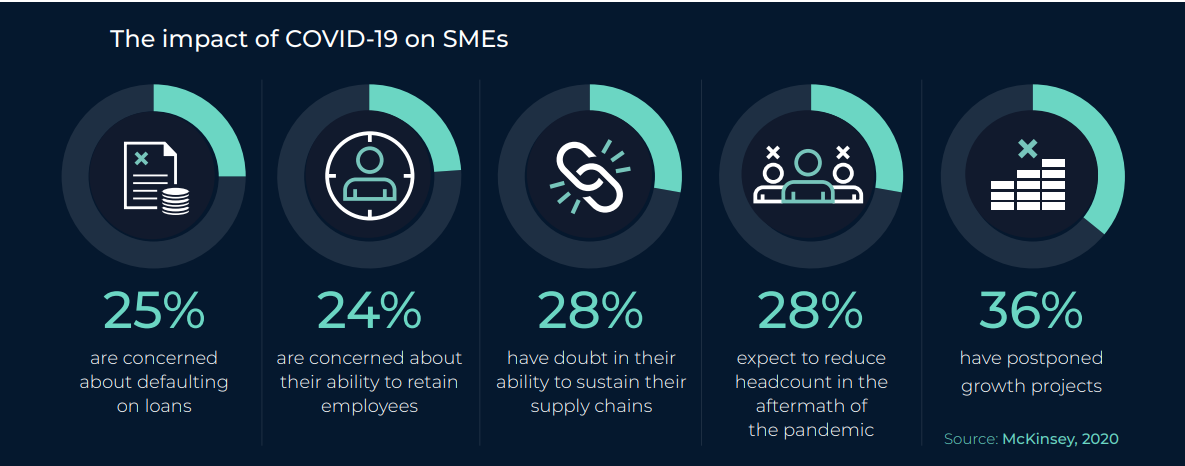In a rapidly changing world, business leaders must embrace disruption to truly overcome it.

The COVID-19 pandemic caused the most widespread disruption to our daily lives since the dark days of 1939. Organisations scrambled to react to an unknown situation with staff being furloughed and capital markets drying up.
As we move out of the pandemic the organisations that have survived have emerged stronger and more resilient but with a new wave of challenges. Employees are looking for more sustainable ways of working and the ‘Great Resignation’ has touched almost every organisation.
PIVOT AND DIVERSIFY
For the startups and SMEs that make up more than 99% of all businesses, retrenchment feels logical, it feels safe. Yet now is a time for bravery, boldness, and innovative thinking. When destruction occurs, it paves the way for new opportunities. It’s no coincidence that research from the Kaufmann Foundation finds that more than half of the companies on the Fortune 500 and over 50 tech unicorns (including Airbnb) were started in a recession.
Yes, deals and acquisitions are still occurring in the upper echelons of the business world. Case in point - Apple’s early August acquisition of Mobeewave. But this isn’t to say that SMEs and startups should be left behind. Now is an ideal time to stress-test and rethink existing business models, to pivot and diversify offerings.
“You need to be agile. You need to think about what you could be doing in addition to what you’re already doing. At this point it’s become almost critical to think like that,” says Christopher Tucci, Professor of Digital Strategy & Innovation at Imperial College Business School. “Try and pivot to find new business models - have two or three on the go simultaneously.”
Professor Tucci suggests firms reimagine existing products with a servitization component or repurpose in-house house skills to create new revenue streams. For example, PassFort, a UK-based software startup, found that by carving out a portion of its existing product and positioning it as a new service offering, the firm could suddenly sell to accounts previously deemed too small.
“We basically unlocked a pool of revenue that we had previously decided not to prospect into,” says Donald Gillies, CEO of PassFort. “That’s led to us generating an operating profit on that new revenue line for the past two months.”
Pivoting can also help firms to capitalise upon shifting consumer habits. If customers are stuck at home, it makes sense that they will order more food online via an app like Uber Eats. Similarly, they will order more wine through another like Vivino, who saw year-on-year growth of 155% in April this year.
EMBRACE NEW TRENDS
COVID has also accelerated existing digital transformation trends as organisations look to meet remote working challenges. Firms ought to fully lean into this change to enable the sort of agile and responsive flexibility that larger firms cannot possibly deliver.
“We’ve found that it’s played very well to our strengths as an agile SME business,” says Rob Hurrell, Business Development Director of Aire Logic Limited, an ICT consultancy working with multiple NHS trusts on digital software solutions. “It’s allowed us to rely on our responsive approach to things. If we were a big, lumbering behemoth software company, we might have found it extremely difficult to pivot to some of the opportunities that have presented themselves.”
Cuts to employee numbers and the shift to remote working may have presented initial challenges, but for forward-thinking business leaders, they have unlocked unforeseen opportunities. If employees can do their job from home, then there’s little stopping firms from leveraging talent based further afield. Why not tap into a wider talent base in a different city or country?
Time away from the office has also renewed the focus on work-life balance for many employees. As such, remote working is now an ideal perk to attract and, crucially, retain talent with. This is especially true for tech firms whose operations can be largely virtual and who are seeking an edge in the post-COVID war for talent.
Talent pools may be expanding, but SMEs and startups can also capitalise on growing localisation too. With the lack of global travel in the past 2 years, investors and businesses are instead looking locally. New supply chains can and will emerge. New, accessible investment opportunities will present themselves. Local firms that can add value have ascended.
In times of rapid disruption, it will be those businesses who can pivot and diversify their service offering, react with flexibility, and meet the evolving needs of customers who will start attracting attention for all the right reasons. But to do so, you need to be bold enough to take the first step - after all, fortune only favours the brave!
Get access to the full e-book below

